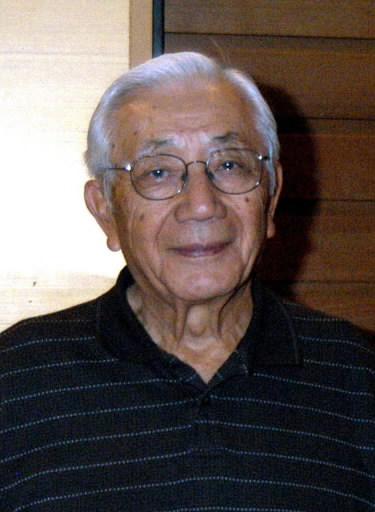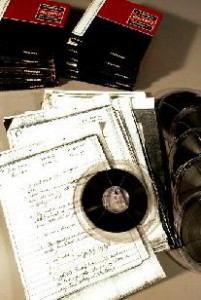Japanese-American language specialists interviewed A-bomb survivors in 1945
Jan. 8, 2010
by Masami Nishimoto, Senior Staff Writer
It has been confirmed that Japanese-American language specialists of the U.S. Military Intelligence Service interviewed survivors of the atomic bombing, along with others, in the devastated city of Hiroshima in December 1945. Audio tapes of recorded interviews and handwritten notes by Wataru Misaka, 87, who lives in the U.S. state of Utah, were found at Hiroshima Peace Memorial Museum. Recently, the Chugoku Shimbun spoke with Mr. Misaka by phone. Missions undertaken by Japanese-American language specialists had remained classified for many years even after the war. Finally, in the 1990s, veterans and others began to testify about the role of these language specialists, and in 2006 the U.S. Department of the Army published a historiography. Through the discovered audio tapes, their activities in the A-bombed city were revealed for the first time.
Among the 13 A-bomb survivors recorded on the audio tapes which the city of Hiroshima obtained from the U.S. National Archives and Records Administration in 1974 can be heard the voice of Mr. Misaka. According to published testimonies of related personnel and the U.S. military historiography, Japanese-American language specialists sent to Japan after the war were posted at the Allied Translator and Interpreter Service (ATIS) of the General Headquarters of the Allied Forces (GHQ). They also accompanied the U.S. Strategic Bombing Survey from early November to late December of 1945 when the team conducted surveys on the effectiveness of air raids at 60 locations throughout Japan.
In Hiroshima, about 30 people, including 10 Japanese-American language specialists, Caucasian officers, and engineers were engaged in the survey. For two weeks starting on December 1, Mr. Misaka interviewed citizens, "who were selected at random, one person in the morning and another in the afternoon" at the former Higashi Police Station in downtown Hiroshima, which had escaped the fires caused by the bombing. The survey consisted of 41 questions including those about their living conditions during the war and their sentiments toward Japanese leaders and the atomic bombing. Mr. Misaka asked questions following the survey written in Romanized Japanese, and wrote down summarized answers in English.
"Since the Japanese people tended to give responses that they thought we wanted to hear, I tried to ask questions that could draw out more candid answers without hurting their feelings," said Mr. Misaka. "I remember interviewing a woman with a small child who had burns. Most of the survivors were noncombatants. Though some people still claim that dropping the bombs accelerated the end of the war against Japan, I saw what had become of Hiroshima and I can't support this view."
Mr. Misaka's parents were from today's Onomichi City, located in the eastern part of Hiroshima Prefecture. After leaving the military, he became the first professional basketball player of Asian descent in the United States.
According to the report compiled by the U.S. Strategic Bombing Survey in 1947, they interviewed 128 people in Hiroshima and Nagasaki, and recorded one of every seven people they spoke with. The conclusion of the report about the effectiveness of the atomic bombings was that despite the severe physical destruction, from the political point of view, the bombings did not serve as significant factors in pressuring Japan to surrender.
Satoru Ubuki, a professor at Hiroshima Jogakuin University, wrote articles on the survey team in the 1970s. Professor Ubuki commented, "I was surprised to learn that a group of Japanese-American language specialists were involved in the survey. Though the survey results contain some biased views, the survivors expressed their negative feelings toward the atomic bombings and their bitterness in interviews. The content of the survey, which portrays the candid sentiments of people soon after the bombings should be reexamined and reevaluated."
Keywords
Japanese-American language specialists
According to the historiography published by the U.S. Department of the Army, "Nisei Linguists: Japanese Americans in the Military Intelligence Service During World War II," the U.S. Army Military Intelligence Service established a Japanese language school in 1941. Second-generation Japanese-Americans and some others were drafted and trained as language specialists, and then engaged in interrogations, radio interception and other duties on the Pacific battle front. During the occupation period, about 2,660 people were involved in interpreting/translating jobs for occupation policies. Recently, the testimonies of former Japanese-American language specialists including the late Kan Tagami, who was a personal interpreter-aide to General Douglas MacArthur, Supreme Commander of the Allied Powers in Japan, and had parents from Hiroshima, have become available online.
It has been confirmed that Japanese-American language specialists of the U.S. Military Intelligence Service interviewed survivors of the atomic bombing, along with others, in the devastated city of Hiroshima in December 1945. Audio tapes of recorded interviews and handwritten notes by Wataru Misaka, 87, who lives in the U.S. state of Utah, were found at Hiroshima Peace Memorial Museum. Recently, the Chugoku Shimbun spoke with Mr. Misaka by phone. Missions undertaken by Japanese-American language specialists had remained classified for many years even after the war. Finally, in the 1990s, veterans and others began to testify about the role of these language specialists, and in 2006 the U.S. Department of the Army published a historiography. Through the discovered audio tapes, their activities in the A-bombed city were revealed for the first time.
Among the 13 A-bomb survivors recorded on the audio tapes which the city of Hiroshima obtained from the U.S. National Archives and Records Administration in 1974 can be heard the voice of Mr. Misaka. According to published testimonies of related personnel and the U.S. military historiography, Japanese-American language specialists sent to Japan after the war were posted at the Allied Translator and Interpreter Service (ATIS) of the General Headquarters of the Allied Forces (GHQ). They also accompanied the U.S. Strategic Bombing Survey from early November to late December of 1945 when the team conducted surveys on the effectiveness of air raids at 60 locations throughout Japan.
In Hiroshima, about 30 people, including 10 Japanese-American language specialists, Caucasian officers, and engineers were engaged in the survey. For two weeks starting on December 1, Mr. Misaka interviewed citizens, "who were selected at random, one person in the morning and another in the afternoon" at the former Higashi Police Station in downtown Hiroshima, which had escaped the fires caused by the bombing. The survey consisted of 41 questions including those about their living conditions during the war and their sentiments toward Japanese leaders and the atomic bombing. Mr. Misaka asked questions following the survey written in Romanized Japanese, and wrote down summarized answers in English.
"Since the Japanese people tended to give responses that they thought we wanted to hear, I tried to ask questions that could draw out more candid answers without hurting their feelings," said Mr. Misaka. "I remember interviewing a woman with a small child who had burns. Most of the survivors were noncombatants. Though some people still claim that dropping the bombs accelerated the end of the war against Japan, I saw what had become of Hiroshima and I can't support this view."
Mr. Misaka's parents were from today's Onomichi City, located in the eastern part of Hiroshima Prefecture. After leaving the military, he became the first professional basketball player of Asian descent in the United States.
According to the report compiled by the U.S. Strategic Bombing Survey in 1947, they interviewed 128 people in Hiroshima and Nagasaki, and recorded one of every seven people they spoke with. The conclusion of the report about the effectiveness of the atomic bombings was that despite the severe physical destruction, from the political point of view, the bombings did not serve as significant factors in pressuring Japan to surrender.
Satoru Ubuki, a professor at Hiroshima Jogakuin University, wrote articles on the survey team in the 1970s. Professor Ubuki commented, "I was surprised to learn that a group of Japanese-American language specialists were involved in the survey. Though the survey results contain some biased views, the survivors expressed their negative feelings toward the atomic bombings and their bitterness in interviews. The content of the survey, which portrays the candid sentiments of people soon after the bombings should be reexamined and reevaluated."
Keywords
Japanese-American language specialists
According to the historiography published by the U.S. Department of the Army, "Nisei Linguists: Japanese Americans in the Military Intelligence Service During World War II," the U.S. Army Military Intelligence Service established a Japanese language school in 1941. Second-generation Japanese-Americans and some others were drafted and trained as language specialists, and then engaged in interrogations, radio interception and other duties on the Pacific battle front. During the occupation period, about 2,660 people were involved in interpreting/translating jobs for occupation policies. Recently, the testimonies of former Japanese-American language specialists including the late Kan Tagami, who was a personal interpreter-aide to General Douglas MacArthur, Supreme Commander of the Allied Powers in Japan, and had parents from Hiroshima, have become available online.









